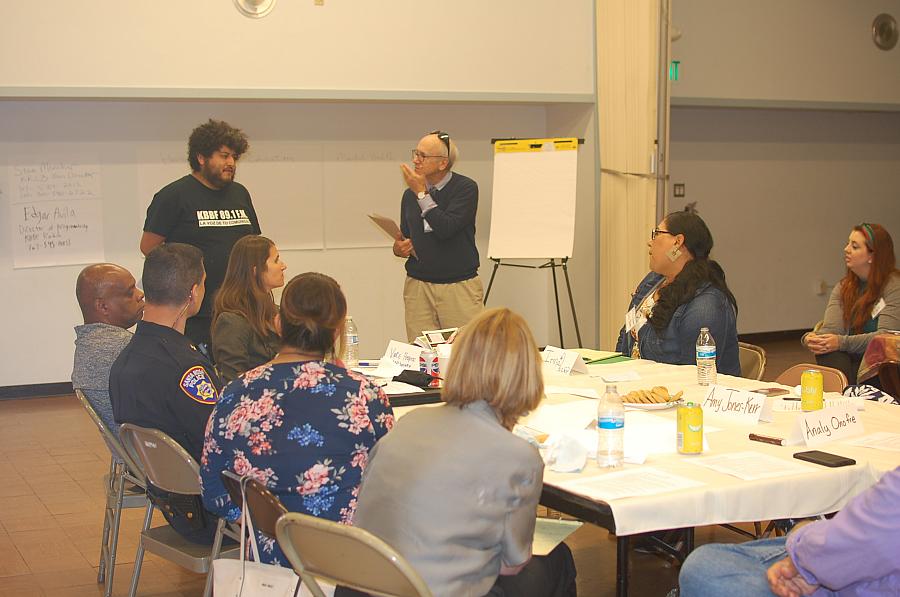Two media outlets come together to look at health in a long-marginalized community

Edgar Avila and Steve Mencher speak with community members in Roseland, California.
The Roseland Health Project brought together two media organizations in Sonoma County: Northern California Public Media (including KRCB Radio and Television) and KBBF-FM, the nation’s first bilingual radio station. The idea was to make an impact in the community by reporting stories about health in the Roseland neighborhood, which became part of the city of Santa Rosa on November 1, 2017.
Our thesis was this: Residents of the neighborhood might begin to feel empowered to have more control over their health if public media told stories in their own language about the improvements that might result from the community’s change in political status.
If those stories also reached decision-makers in city and county government and the nonprofit sector, those leaders would have more information to make decisions that could influence the health of this largely Latino area in positive ways.
Here are some things we learned along the way:
1. Listen to your sources
Probably the best thing we did with this project was to build in time and space to listen. We started with a meeting of the most significant players in city government and nonprofits working in health in Roseland. There was no need to convince them that everything from infrastructure to parks are key “social determinants of health.”
We also went out into the neighborhood to interview residents twice: once at an important cultural event, and once at a table outside a community grocery store. We personally touched nearly 100 residents and had them share their top health concerns.
2. Under-promise and over-deliver
That would have been a good approach. Instead, we overpromised and barely managed to complete our work under the pressure of our deadline. Everything, we should have realized, takes longer than you expect. And especially when you’re breaking new ground, and reporting on subjects you’re learning about, it takes time to build up sources and trust, and to put together deeply reported stories.
Grants demand time for progress reports, budgets, scheduling. All of that work must be taken into account when planning the deliverables.
The work of reporting and producing stories can’t happen unless the groundwork is laid.
All of the staff members and volunteers involved in project had to commit to many kinds of work, from meticulously going through questionnaires and surveys, to translations, to producing audio and video. Some of that work is fun, challenging and broadening. Other parts are routine and less engaging. In all cases, the work needs to be done, and all participants must be prepared to do the challenging work as well as the boring jobs.
3. Acknowledge and celebrate key collaborators
When we decided to attempt a kind of collaboration we hadn’t tried before, we knew we needed a third partner in the effort. Through a lucky introduction, we met Magaly Rivera of the Latino Public
Radio Consortium. Magaly and her team were able to support both stations.
4. Pay attention to cultural competence and sensitivities
In planning the first community meeting, KRCB reached out to Santa Rosa Police Captain Rainer Navarro, a community relations officer, and invited him to attend before discussing the invitation with KBBF. KRCB organizers assumed that either station could invite guests, and had no sense that any guest might make others uncomfortable.
But KBBF, with a better view into its community, shared the thought that a police captain in full uniform might make some guests uncomfortable. With many in the community reporting anxiety about immigration status, and the Latino community still feeling the after-effects of police violence in a landmark case, the presence of police, even local cops, always needs to be carefully considered.
5. What does it mean to make an impact on a community’s health?
The number one takeaway from our project is that everyone we met in the neighborhood saw our work as a valuable beginning, but wanted more. More stories, more subjects, more attention to the important work already going on in the neighborhood.
We’re a bit overwhelmed, and feel as though we’ve just touched upon the subject of health in Roseland after the neighborhood’s annexation. But we understand that a small grant-funded project doesn’t really give us the opportunity to make huge changes. It’s hard to measure the direct impact of our work on the health of our neighbors, but we believe we’ve started moving the conversation in helpful directions.


